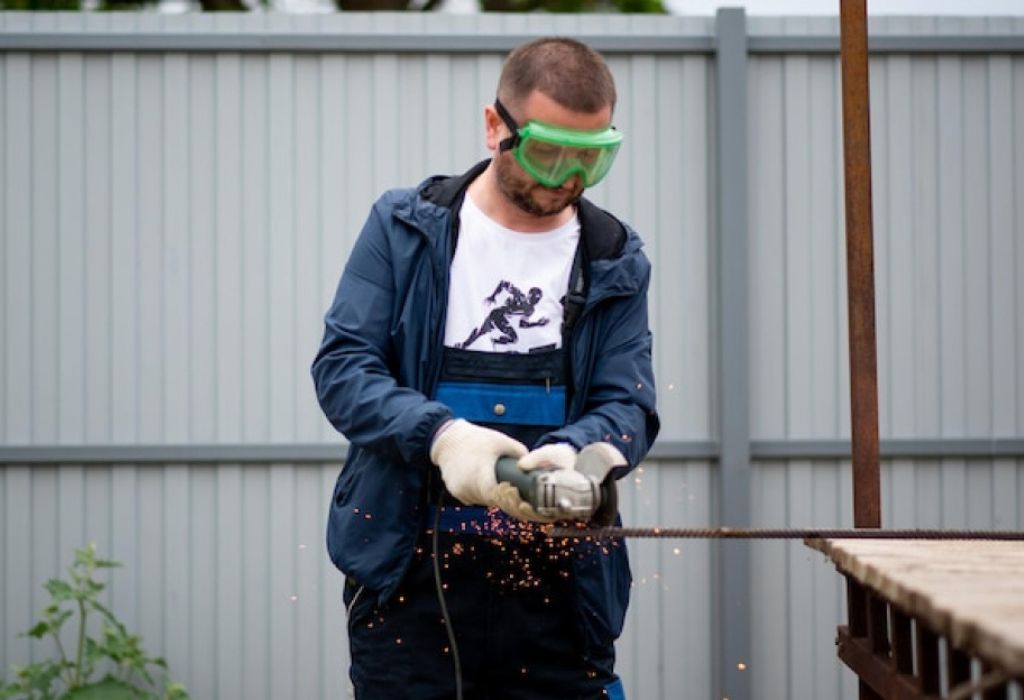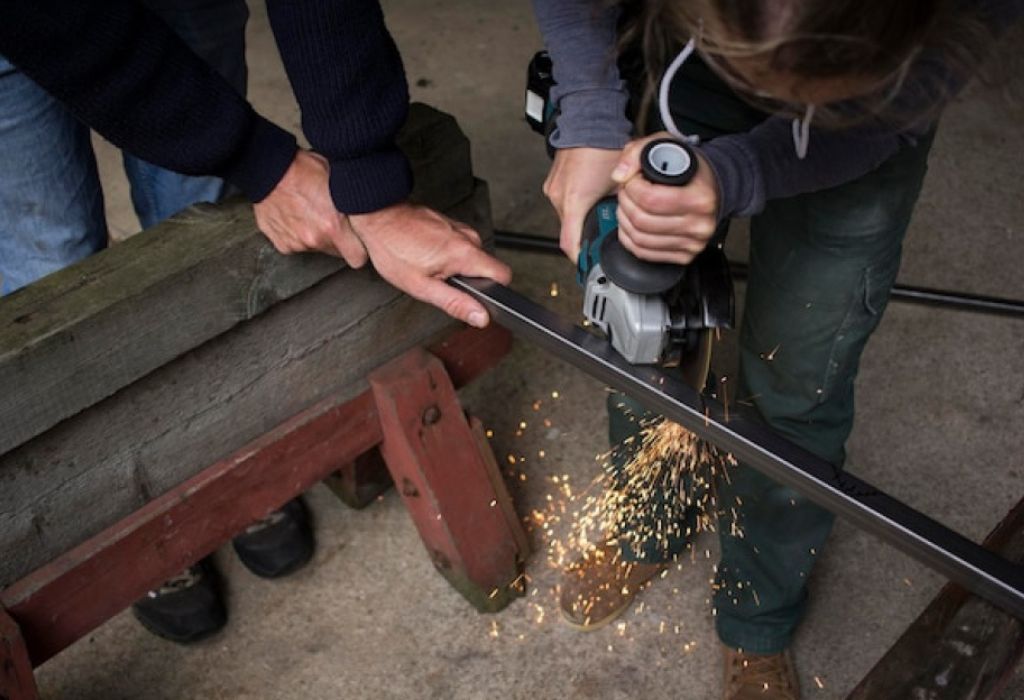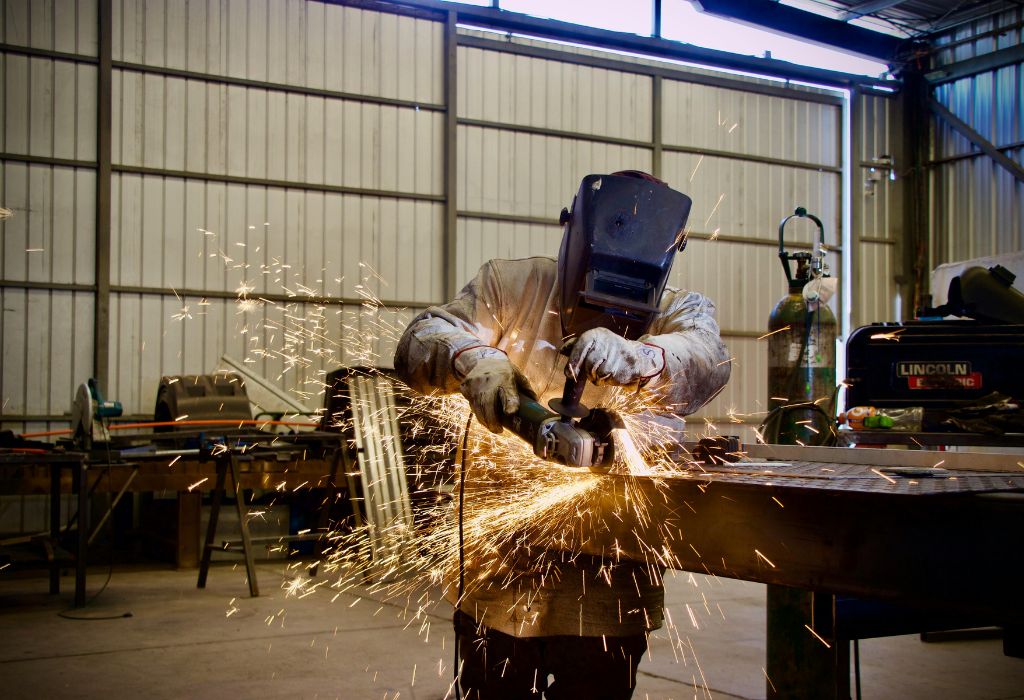A teenager in Newark stares at a welding arc for the first time and imagines a future career.
Welding promises steady work, valuable skills, and solid pay across New Jersey. But many beginners wonder what exact steps to take to land their first job.
The pathway to become a welder in NJ usually starts with education.
Employers prefer applicants with a high school diploma or GED, strong math basics, and safety awareness.
From there, training options include vocational schools, community colleges, and private welding programs, many offering multi-process instruction in MIG, TIG, Stick, and Flux-Cored welding.
According to the American Welding Society, certification through an Accredited Test Facility (ATF) provides proof of skill that employers trust (AWS).
Wages make the career attractive. The Bureau of Labor Statistics reports a national median pay of about $51,000 per year, while CareerOneStop shows New Jersey welders earning similar or higher, depending on industry and experience (BLS; CareerOneStop).
Entry-level positions start lower but can quickly rise with additional certifications such as structural welding D1.1 or pipe welding 6G.
This guide breaks down everything step by step: how to meet NJ requirements, pick the right training program, pass AWS certification tests, and find apprenticeships or entry jobs.
It also explores pay expectations, advanced certifications, and career outlook. By the end, you will know exactly how to become a welder in NJ and where to begin your journey.
How to Become a Welder in NJ: Easy Guide

Quick Answer — How to Become a Welder in NJ
Becoming a welder in New Jersey requires a combination of education, training, and certification. The journey usually starts with a high school diploma or GED to meet basic requirements. Strong math and shop skills are essential since welders work with fractions, conversions, and precise measurements.
From there, students enter technical schools, community colleges, or private welding programs that teach processes like MIG, TIG, Stick, and Flux-Cored welding. Many New Jersey schools also partner with Accredited Test Facilities (ATFs) so students can test for AWS Certified Welder credentials, which employers often require.
Completing OSHA-10 safety training further improves employability. With certification in hand, new welders can apply for entry-level jobs or apprenticeships, gaining real-world experience in fields like construction, fabrication, and ship repair.
Do welders need a license in NJ?
No, New Jersey does not issue a state welding license, but employers expect AWS or employer-specific certifications.
How long does it take to become a welder in NJ?
Most training programs run 3–9 months, depending on schedule and depth of instruction (UTI Bloomfield).
Is certification required to work?
Yes, especially for structural and pipe work, since AWS credentials prove ability to meet code standards.
Can you work while training?
Yes, many apprenticeships pay while you learn.
What’s the fastest path into welding?
Complete a short welding program, pass AWS certification, and secure an entry-level role.
Step 1 — Meet NJ Basics (Diploma, Age, Safety)
A high school diploma or GED is the minimum education requirement in New Jersey for most welding jobs and training programs. Some employers and unions specifically ask for transcripts to confirm math competency.
In addition to academics, OSHA training is critical. Most welders start with OSHA-10 Construction or General Industry, while foremen or supervisors may eventually need OSHA-30. These safety cards assure employers you understand workplace hazards, PPE, and accident prevention.
Some welders later pursue teaching or supervisory roles. The New Jersey Department of Education outlines pathways for career and technical education instructors, which require additional education or years of verified industry experience (NJDOE). This is not necessary for entry-level welders but useful for long-term career planning.
Can I start welding without a GED?
Some shops may hire helpers without one, but most schools and apprenticeships require a diploma or GED.
Do welders in NJ need OSHA training?
Yes, most job sites require OSHA-10 at a minimum.
Is a driver’s license needed?
Often, since many welders must travel to job sites.
What math skills are important?
Basic algebra, fractions, and geometry for measuring and cutting.
Is drug testing common?
Yes, particularly in construction, energy, and union jobs.
Step 2 — Choose a New Jersey Training Path
Training is where aspiring welders build hands-on skills. New Jersey offers multiple paths, from community colleges and county vocational schools to private technical institutes.
For example, Lincoln Tech has NJ campuses offering welding programs that cover MIG, TIG, Stick, and Flux-Cored welding (Lincoln Tech). Similarly, UTI Bloomfield advertises a 36-week Welding Technology program, emphasizing multi-process training and career support (UTI).
County colleges like County College of Morris (CCM) also provide AWS Level 1 welding courses, often linked with Accredited Test Facilities for certification exams. These programs vary in cost, schedule, and depth, so students should compare job placement support and access to certification testing before enrolling.
Do NJ welding schools include AWS certification?
Some include testing fees; others require paying separately. Always confirm with admissions.
Can I study welding part-time?
Yes, many schools offer night and weekend classes for working students.
Is financial aid available?
Yes, through federal FAFSA, NJ One-Stop workforce grants, and school scholarships.
Which welding processes should be learned first?
Start with MIG and Stick, then add TIG for stainless and aluminum.
What makes a good program?
Hands-on hours, qualified instructors, and AWS testing access.
Step 3 — Earn AWS Credentials (What, Where, How)
The AWS Certified Welder (CW) credential is the most common entry certification in New Jersey. Unlike written exams, this is a performance-based test where you must pass visual inspection and bend tests under the supervision of an AWS Certified Welding Inspector (AWS CW Program).
Tests are offered at Accredited Test Facilities (ATFs) across NJ. Students can choose processes like SMAW (Stick), GMAW (MIG), GTAW (TIG), or FCAW (Flux-Cored). Test plates are performed in different positions such as 3G, 4G, or 6G, with 6G pipe considered the toughest and most valuable for higher-paying jobs.
AWS certifications don’t expire but require continuity logs proving you have used the process within the past six months. Employers may also require additional in-house weld tests specific to their projects.
How much does AWS testing cost?
Prices vary but typically range from $150–$300 per test, plus retest fees.
Which certification should NJ beginners choose?
Most start with D1.1 structural steel plate in 3G/4G.
Do AWS certs expire?
No, but continuity must be maintained.
Is 6G worth it early on?
Yes, if you want to pursue pipe welding, which pays more.
Where can I test in NJ?
At ATFs such as Lincoln Tech, CCM, or independent test facilities listed on AWS’s site.
Step 4 — Apprenticeships, Unions, and Entry Jobs in NJ
Apprenticeships are one of the most practical ways to enter the welding trade in New Jersey. They allow beginners to earn while learning, combining classroom instruction with supervised on-the-job training. Many apprenticeships last 3–5 years and include wage increases as skills progress.
Union programs are strong in NJ, especially in construction and ship repair. Joining a union can provide access to structured apprenticeships, negotiated wages, and benefits such as healthcare and retirement. However, non-union employers may offer faster entry and more flexible opportunities, particularly in small fabrication shops.
Entry-level jobs often start as welder helpers or fitters, where responsibilities include prepping materials, tacking, and assisting experienced welders. These positions allow beginners to gain hands-on experience while working toward advanced certifications.
How do I find welding apprenticeships in NJ?
Check NJ One-Stop Career Centers and union websites for openings.
Do apprentices get paid?
Yes, apprentices earn wages that increase as skills improve.
Are union welders paid more?
Often yes, but non-union shops can also pay competitively.
What’s a common entry-level job title?
Welder helper, fitter, or apprentice welder.
Will employers retest my skills?
Yes, most employers require a weld test even if you are certified.
Step 5 — What Welders Make in New Jersey (2025 View)

Welding can be a financially rewarding career in NJ. According to the Bureau of Labor Statistics, the median annual wage for welders in the U.S. is about $51,000, with higher earnings in industries like construction and energy (BLS).
CareerOneStop reports that New Jersey welders earn similar or slightly higher wages, depending on skill level and location. Entry-level welders may start around the 25th percentile, while experienced welders with multiple certifications often move into the 75th percentile range or higher (CareerOneStop).
Factors that influence pay include certifications, job site type, overtime availability, and whether the work is unionized. Welders with pipe welding certifications, such as 6G, typically command the highest wages.
What is the average entry-level welder salary in NJ?
Around $40,000–$45,000 annually, depending on location and employer.
Do union welders earn more in NJ?
Yes, union contracts often guarantee higher wages and benefits.
Which welding processes pay the most?
Pipe welding and TIG welding on stainless or exotic metals.
Can overtime significantly increase earnings?
Yes, overtime and shift work can boost pay considerably.
Are salaries higher near NJ ports and refineries?
Yes, industrial hubs often pay more due to demand and risk.
Step 6 — Schools and Programs to Consider in NJ
Several well-known schools in New Jersey provide welding training. Lincoln Tech offers welding programs in Mahwah and South Plainfield, covering major processes and preparing students for AWS testing (Lincoln Tech).
UTI Bloomfield provides a 36-week Welding Technology program, teaching multiple welding methods and offering career placement support (UTI). County colleges such as County College of Morris (CCM) also run welding courses, often partnered with AWS Accredited Test Facilities.
When choosing a program, students should consider location, scheduling (full-time or evening), financial aid options, and whether the program includes AWS test fees. Many schools advertise employer partnerships, making job placement easier for graduates.
Do NJ schools include certification costs?
Some do, but many require separate payment for AWS testing.
Which school has the shortest program?
UTI Bloomfield’s welding program can be completed in 36 weeks.
Are night classes available in NJ?
Yes, many schools offer evening and weekend schedules.
Can financial aid cover tuition?
Yes, FAFSA, NJ One-Stop grants, and scholarships can help.
Should I pick a school with an ATF?
Yes, it simplifies certification testing and improves job readiness.
Step 7 — Skills NJ Employers Want (Shop to Site)
Employers in NJ expect welders to master core welding processes, including MIG (GMAW), TIG (GTAW), Stick (SMAW), and Flux-Cored Arc Welding (FCAW). Each process is valued for different industries, with MIG and FCAW common in fabrication and TIG used for high-precision work.
Beyond welding itself, employers want welders who can read blueprints, follow Welding Procedure Specifications (WPS), and document Welding Qualification Test Records (WQTRs). Consistent bead quality, proper fit-up, and clean work are highly valued.
Soft skills also matter. Employers prefer welders who are punctual, reliable, and can work safely in team environments. Additional certifications, such as forklift operation or aerial lift training, can also make a candidate stand out.
Which welding process is most in demand in NJ?
MIG and FCAW for fabrication, TIG for specialized jobs.
How important is blueprint reading?
Very important, especially for structural and code work.
Do NJ employers require WPS knowledge?
Yes, for structural and code-based projects.
Are soft skills important?
Yes, reliability and teamwork are essential.
Do inspection skills help?
Yes, basic weld inspection knowledge makes you more valuable.
Step 8 — Certifications Beyond AWS CW (Level-Up Options)
Once you’ve secured your AWS Certified Welder (CW) credential, you can pursue more advanced certifications to boost your career. Many New Jersey employers look for welders with D1.1 Structural Steel certification since it applies to construction and fabrication.
Pipe welders often pursue 6G pipe certifications, which test all positions and are considered one of the toughest exams. Passing this exam opens doors to higher-paying roles in pipelines, refineries, and shipyards.
Some welders also move into inspection. The AWS Certified Welding Inspector (CWI) credential requires experience and coursework but offers higher pay and leadership opportunities. Aerospace welding certifications such as D17.1 are also valuable for those working in specialized industries.
Is AWS CW enough for entry jobs?
Yes, but advanced certifications improve pay and mobility.
What’s the most valuable certification in NJ?
6G pipe welding is highly sought after for industrial jobs.
Do certifications expire?
They require continuity logs and sometimes renewal tests.
Is inspection a career path?
Yes, becoming a CWI can lead to supervisory or inspection roles.
Should I pursue multiple certs?
Yes, stack certifications to maximize employability.
Step 9 — Job Search in NJ: Portfolio, Applications, Interviews
After training and certification, the next step is landing your first job. A strong portfolio showcasing your weld coupons, bend test results, and project photos can help you stand out. Many employers in NJ ask to see work samples or test results before making a hire.
When applying, create a one-page resume highlighting processes you know, certifications earned, and safety training. Include OSHA-10 or OSHA-30 cards, as well as any relevant shop skills like blueprint reading.
Interviews for welding positions often involve a hands-on test, where candidates must demonstrate proficiency on a weld joint. Arriving on time with your own PPE and confidence in your skills makes a strong impression.
Do NJ employers require a weld test?
Yes, most employers retest applicants even with certifications.
What should a portfolio include?
Photos of welds, bend test results, and certifications.
How should I prepare for an interview?
Practice welding joints in the positions you’re certified for.
Is PPE required at interviews?
Yes, bring a hood, gloves, and basic gear.
How soon should I follow up?
Send a thank-you email within 24 hours.
Step 10 — Timeline & Budget: From Zero to Hire in NJ

The journey to becoming a welder in NJ can be completed in under a year. Many programs last 3–9 months, followed by AWS certification testing. Apprenticeships may take longer but allow you to earn while you learn.
A typical timeline looks like this: Month 1–2: Enroll in school, complete OSHA-10. Month 3–6: Train in MIG, TIG, and Stick. Month 6–9: Take AWS CW certification and apply for entry-level jobs. Apprenticeships extend training but add income immediately.
Budget planning is important. Tuition can range from $5,000–$15,000, plus the cost of PPE, textbooks, and certification fees. AWS tests generally cost $150–$300 per attempt, depending on the process and facility.
How much does welding school cost in NJ?
Between $5,000 and $15,000, depending on program length.
What is the fastest path into the field?
A 36-week program plus AWS certification.
Do apprentices pay tuition?
No, apprentices are paid employees while learning.
Can financial aid cover costs?
Yes, FAFSA, NJ workforce grants, and scholarships help.
How much should I budget for PPE?
Around $300–$600 for hood, gloves, boots, and jacket.
Step 11 — Outlook: Why Welding in NJ Is a Smart Bet
Welding remains in high demand across New Jersey. Industries such as construction, transportation equipment, and utilities consistently need skilled welders. The state’s proximity to ports, refineries, and industrial hubs means steady opportunities for certified professionals.
The Bureau of Labor Statistics projects welding jobs to remain stable nationwide, with openings driven by retirements and infrastructure needs (BLS). NJ’s focus on transportation and industrial development ensures welders remain valuable.
Automation in welding may change how jobs are done, but it will not eliminate welders. Skilled professionals who can set up, operate, and inspect automated systems will continue to be in demand.
Are welding jobs stable in NJ?
Yes, with strong demand in construction and industrial work.
Will robots replace welders?
No, but automation will create new roles for skilled operators.
Which NJ industries hire the most welders?
Construction, energy, ship repair, and fabrication shops.
Is relocation within NJ helpful?
Yes, jobs near ports and refineries often pay more.
Can welders move into inspection?
Yes, AWS CWI certification leads to quality control roles.
Conclusion
Becoming a welder in New Jersey is a clear, achievable path. Start with a high school diploma or GED, then pursue training at a welding school, technical institute, or community college. Pass AWS certification at an Accredited Test Facility, complete OSHA training, and apply for apprenticeships or entry-level jobs.
With median salaries around $51,000 nationally and New Jersey offering competitive pay, welding is a career that rewards skill and persistence. Advanced certifications such as 6G pipe welding or CWI open even more doors.
By following these steps, anyone can build a solid future in welding. Whether your goal is a steady union job, travel welding, or supervisory roles, New Jersey provides the schools, certifications, and opportunities to get started.

I’m Darrell Julian, the founder, lead writer, and hands-on welding enthusiast behind ArcWeldingPro.com. With more than 15 years of real-world welding experience, I created this platform to share what I’ve learned in the field, in the shop, and in the heat of the arc.


